Entries tagged with “What’s this cooking stuff all about?”.
Did you find what you wanted?
Wed 3 Mar 2010
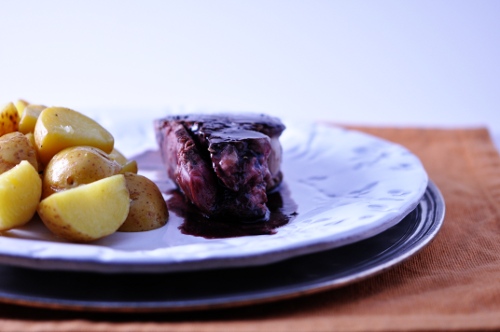
Last month, Michael Ruhlman challenged food bloggers to join him in thinking about why we cook. His post has received over 200 comments and has inspired many blog posts in response. Here is mine.
Why I Cook
I cook because I love to eat. At the heart of all my reasons, my cooking is primarily an extension of my deep love of food. Eating involves my senses - the sight of the food, its aroma, its heft in my hand and texture in my mouth, the sounds it made as it was prepared - all of this before it even reaches the deep ocean of the experience of taste. Cooking literally feeds my joyful affection for food.
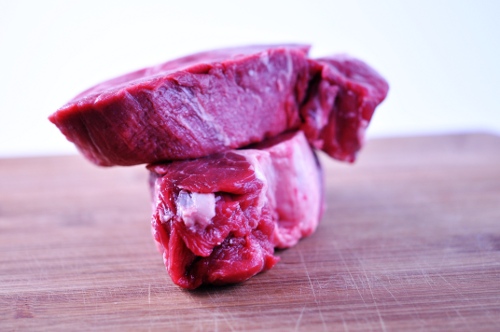
I cook because I like to work with my hands. I relish relating to the world kinesthetically; when I cook, I manipulate ingredients with my hands until they become something else, something wonderful. Everything I create a work is cerebral, words on a page. Cooking lets me make something I can touch and feel and experience more fully.
I cook because I need a creative outlet. I can’t remember a time when I haven’t created things. Drawing, painting, dancing, sewing, knitting, acting, writing, building, quilting, beading, sculpting…it has always been something. As I have noted here many times, I often work long hours. This leaves me with little time for hobbies, especially during the week. Since we have to eat, I have always felt like cooking dinner each night kills two birds with one stone. I get to spend time doing something I love, and it happens to fill our bellies at the end. Win-win.
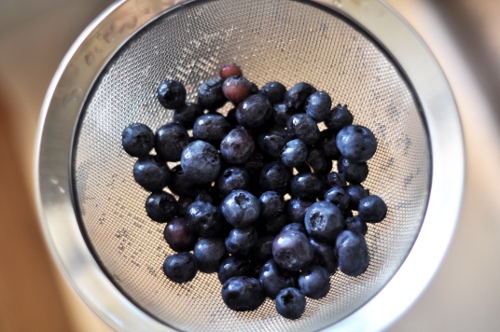
I cook because there are endless lessons to learn and skills to master. In some ways, the world of cooking presents an impossibly steep mountain that reaches into the heavens. But I set out for a climb anyway, knowing I won’t ever reach the summit. I teach myself new techniques and concepts along the way, and every success pays dividends.
I cook as a way to relate to people. Food is a way to show love, affection, friendship, kindness. I feel like I can express my support for those close to me so much more eloquently through a well-timed chocolate babka than I can with words. When I cook for others, the food speaks for me. It tells them that they are worth my time, worth the effort.
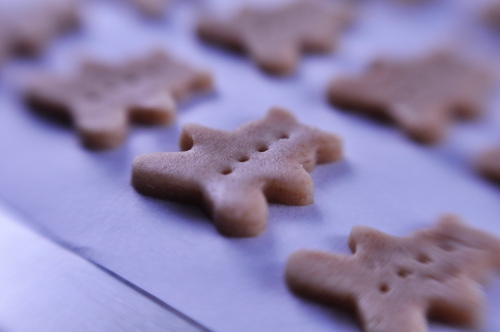
I cook because it fascinates me. Cooking is the perfect storm of science, art, and magic. There is so much to know about the physical and chemical properties of my ingredients; the more I learn, the more enthralled I become. This was what first attracted me to baking (well, that and the wonder of frosting). Combine a whole lot of nothing - flour, water, yeast, salt - and end up with a crusty loaf of bread, one very special something. Add the hearty beauty of roasted garlic and fresh herbs, and that simple bread becomes something unforgettable, craveable. Cube it, toss with tomatoes and cheese, douse with oil and vinegar and a beautiful panzanella jumps out. There are endless combinations and variations on limitless themes, each more delicious than the last. When I step into my kitchen and begin to cook, I feel as though I’m trying to throw my arms around a glorious expanse of wonder and discovery. With each new dish, my enthusiasm grows. I use cooking to feed both my belly and my soul.
What about you? Why do you cook?
(Keep reading Salty Spoon Challenge, Month 2…)
Wed 3 Feb 2010
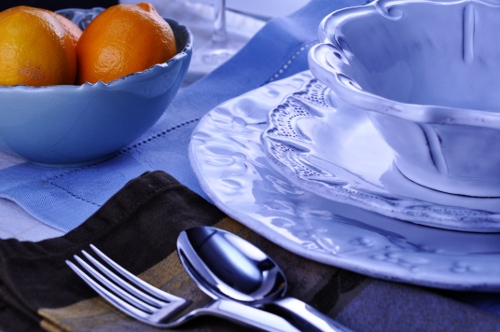
Is there anything more effervescently exciting to send out into the world than an invitation? Regardless of the event, I find a certain kind of lime green, spine-buzzing energy every time I nudge one out for consideration. By saying to your recipients here, come share this with me, you open a piece of yourself to them and wordlessly communicate your (hopefully) very best intentions. It’s a magical practice and I hope I never tire of it.
So I am very, very excited to invite you today to join me for the coming year in the Salty Spoon Challenge. Each month, I will pose a new kitchen challenge that is designed to help you adopt the basic habit of cooking for yourself. We will start small and build from there. The challenges will be cumulative; part of each month’s new challenge will be to maintain the goals of the preceding challenges, unless otherwise indicated. We’ll do this for a year. You can join any time. You can quit any time. All you have to do is try. The challenges are open to anyone and everyone, regardless of experience. The point here is not to follow a specific learn-to-cook curriculum, but rather to increase your skills and comfort in the kitchen by challenging yourself with one new parameter a month. As we work through the challenges, we’ll think critically about how and what we feed ourselves. At the end of a year, we’ll have made incremental but meaningful changes to our approach to our food.
The challenges will begin on (or around) the first day of each month. There will be a post on the Salty Spoon home page announcing the challenge, and the Salty Spoon Challenge page (links at the top right) will list links to past challenges. We can discuss ideas, tips, progress, and frustrations in the challenge post for the current month - comments will always stay open.
There are hundreds (thousands?) of food blogs in this vast internet of ours. I am proud to be a part of such a vibrant, expansive community. In a bout of January reflection, I gave extensive and serious consideration to what exactly I want to bring to this landscape. I thought about why I started The Salty Spoon in the first place: to help inspire other busy people to get in their kitchens and start cooking. I thought about how I felt about cooking when I was living in my first apartment after college. The thought of preparing the majority of my meals for myself was overwhelming. I liked to bake, but that was about it. My arrival at my present state of cooking most of my food at home came gradually, over a period of several years.
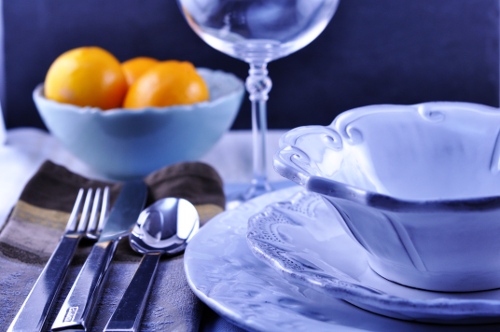
Looking back, I wish I had taken a more purposeful approach from the beginning. And that’s what I’ve decided to offer you through the Salty Spoon Challenge - a purposeful approach to adopting the habit of cooking for yourself. Stick with it, and in a year you will find yourself in your kitchen more often, preparing better food, and enjoying it. We’ll get there, I promise.
Let’s start with a few guidelines. First, stay positive. Cooking is about learning, thinking, experimenting, and indulging. I do not accept the statement “I can’t cook.” If you can read and follow directions with a basic helping of common sense, you can cook. This isn’t about turning out Michelin-worthy covers for 200 dinner guests; it’s about feeding yourself good food at home.
Second, be open to new ideas. We’re going to share our experiences with each other here, and we have a lot to learn from each other - myself included. One of the things I love most about cooking is its essential, communal aspect. Let’s help each other grow as cooks.
Finally, have fun with it. Push yourself, but don’t get bogged down in the details. There is no shame in simple food as long as it’s good food. Make what you love to eat. If you aren’t an experienced home cook, or you’ve found yourself in a cooking rut that has left you bored and uninspired, get ready to surprise and delight yourself. There is an indescribable satisfaction in the ability to think of something you really want to eat, turn to your kitchen, and make it. Explore, stretch, enjoy.
Are you ready? Let’s cook something.
Keep reading Salty Spoon Challenge, Month 1…)
Sun 25 Oct 2009

Oh, hi.
It’s been a while since those Wondrous Pillows of Carbtastic Splendor graced my editing window, and I want to assure you we haven’t been starving in the silence. Since that post, I’ve been traveling, working, and thinking (and, admittedly, making several things that have needed a bit of tweaking before I present them to you – such is the mystery behind the food blogger’s curtain).
I’ve been thinking a lot about Gourmet. Though I had only just begun my subscription (ironically, the first issue I received was its last), I could not help but recognize the magnitude of this loss. When so much talent dissipates after accumulating so handsomely, the void is severe and deep. I read post after eloquent post from others, eulogies for this publication that brought elegance to so many dining tables. It was heartening to see a fitting tribute assemble itself from the food community.
But then came Christopher Kimball’s New York Times editorial about Gourmet, the internet, and the current state of recipe writing. In his hamfisted attempt to explain how a publication with such a dedicated following could meet its end, Kimball took several cheap shots at food bloggers, calling us a “ship of fools” who will never produce results as reliable as his hermetic test kitchen.
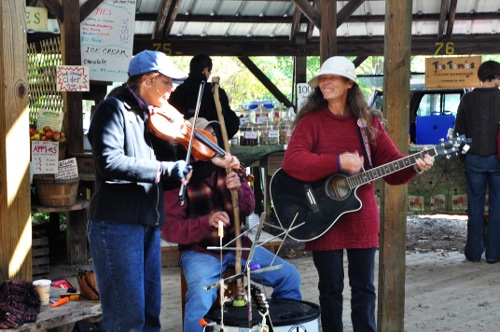
I have been tempted to respond. Kimball is someone I have, admittedly, looked up to in the past. He has worked tirelessly to craft a franchise of publications and programs that have helped a growing generation of home cooks achieve consistency in their kitchens. I regularly participate in test panels for America’s Test Kitchen. It’s a bit disheartening to see that Kimball holds such a contemptuous view of the food blogosphere. In my head, while driving to work or peeling apples for pie (coming soon) or pushing a cart through the grocery store, I have written several rejoinders that delve into my beliefs about the essential, communal qualities of cooking and creating recipes. But I haven’t let any of those arguments make their way to the page. There’s no need. As his subsequent responses show, Kimball really believes his way of cooking and writing recipes is the best. He doesn’t value the things we, as food bloggers, bring to the proverbial table. If the mountain of other feedback he has received from the blogosphere hasn’t given him pause about holding so steadfastly to a view that continues to alienate a community of people who could lend substantial support and conviviality to his business, then one more rant from me won’t do it either.

To tell you the truth, I’m grateful to Kimball. His editorial and its aftermath have served as a lightning rod to motivate me to examine my own beliefs about food, about cooking and, most importantly, about what I’m doing here with The Salty Spoon. Without boring you with a manifesto, let me simply say this: cooking is a part of my life and always will be. I share that part of my life with many people, both online and in person. I work at incorporating good food into my life and my household every day, and I hope by showing you, my readers, this process and my joy in executing it that you might be moved to join me. I am not an expert or a trained chef. Rather, I’m a kinesthetic learner with a big appetite and a warm heart. I love to eat and I love to laugh, and I try to inspire you to do the same. If that means I’m sailing blissfully along on Kimball’s ship of fools, so be it. I rather like the view from here.

Fall recipes are coming soon. Though it’s a bit of an ephemeral concept here in Los Angeles, these pictures from our recent trip to Ithaca help me imagine cooler air, musty leaves, and good things made from apples. The moon is waning, and all is well when a cup of cider is close by.
Mon 14 Sep 2009
This Wednesday marks the one-year anniversary of the publication of The Flavor Bible, a book that should hold a prominent place in any curious cook’s library. I’ve previously mentioned it here and here.
Recipes are lovely, and I can’t possible buy or read enough traditional cookbooks in this lifetime. But there is another side to cooking that I think is just as important for cooks, especially home cooks, to explore. It’s the improvisational side. The process that starts with a blank slate of a clean kitchen and comes to life with one or two ingredients - something that looked particularly good at the store that week, a memory of a favorite dish, a scene from a movie, a song, a mood.
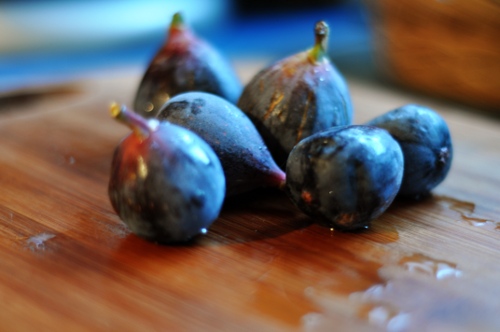
To make something edible out of this process, it’s important to have a basic grasp of cooking fundamentals - how to saute, how to poach, how to steam, how to broil, etc. But it’s also critically important to have a way to get your hungry head around the flavors before you begin, lest you waste perfectly good chocolate chip cookies by sullying them with mint (hypothetically, of course). Authors Karen Page and Andrew Dornenburg help guide this process by providing (though what can only have been a Herculean effort) an index of ingredients and the flavors that best compliment them. Need a hand figuring out what to do with the basket of figs that called out to you at the farmers’ market? Turn to page 162 and see the 70+ flavors that will best compliment them (personal favorite: goat cheese).
My own improvisational process has benefited greatly from The Flavor Bible, and I’m happy to help Page and Dornenburg celebrate the anniversary of this wonderful text.
Thu 16 Apr 2009
Posted by Bria under Baking
[2,760] Comments


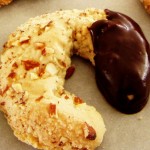
Once upon a time, an enterprising member of a hunter-gatherer tribe grew restless at the idea of yet another bowl of the same mammoth stew and added a handful of peppery-smelling leaves to the batch. The first bite brought surprise and delight to all, and soon seasoning the meat was de riguer.
Or something like that. We don’t really need the specifics. Amidst the variety of reasons our most ancient ancestors began seasoning and varying their food is a reason so simple and obvious it generally goes without saying: because it tastes good.
And so it goes today – we continue to think, churn, generate, experiment, augment, and create, create, create beautiful, wonderful, delicious dishes. Cooking is both an art and a science, and is easily accessible at some level on both fronts. But the art side has a special, unique aspect to it. Everyone participates in it, somehow, every day. You don’t have to listen to music, view a play, examine a painting, or read a book every day, but you do have to eat. I think this is why I find cooking so appealing; it’s at the very core of our lives, waiting to be drawn out and caressed.
Yes, there are different strata of cooking and food. There are simple dishes and complicated ones. I can make a complicated sauce using fifteen ingredients, or a baguette using four. “Good” is so subjective, and doesn’t necessarily correlate to expense, difficulty, or complexity. Food: the great equalizer.
It is also very personal. Everyone’s palate is different, sensitive in varying ways. To prepare food for someone is, in a sense, to attempt to really know a very fundamental part of them. And this is one of the reasons I love to cook. It is powerful to fill an empty plate with the symphonic orchestrations of your kitchen’s contents and your own two hands. You begin with nothing, and end up with a serious something. When you cook with someone else in mind, when you reach out and access someone else’s palate and say “I think I know what you’ll like,” you share a part of yourself with them. I gave my bridesmaids a cookbook of my favorite recipes before my wedding. In the introduction, I told them “I consider the kitchen to be the heart of any home; in sharing these recipes with you, I hope to share a piece of my heart as well as my home.”
I continue to connect with the people around me through food (see, e.g., this website). Recently, upon realizing I had forgotten to wish a coworker happy birthday, I told him I would bring him the baked good of his choice the following Monday. He asked for Mandelhoernchen, a favorite cookie from his childhood in Germany. I happily agreed. He told me later, after leaving me what promises to become one of my all-time favorite voicemails, that he didn’t realize when I told him to specify a baked good that I would be making it. I couldn’t imagine doing anything else.
(more…)













